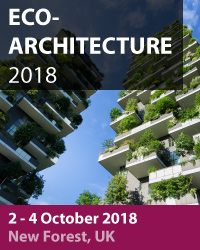7th International Conference on Harmonisation between Architecture and Nature
2 - 4 October, 2018
New Forest, UK
Overview

The seventh International Conference on Harmonisation between Architecture and Nature took place in the New Forest, UK. The Conference was organised by the Wessex Institute, UK, represented by Dr Stavros Syngellakis, a member of the WIT Board of Directors.
This conference follows previous successful meetings in a series which started in the New Forest, home of the Wessex Institute, in 2006; and continued in the Algarve (2008), A Coruna (2010), the island of Kos (2012), Siena (2014) and Alicante (2016).
The objective of the conference was to review the challenges and new opportunities of contemporary architecture to promote sustainability and adaptation of design to natural environment taking advantage of progress in new building technologies and the development of new materials.
Opening of the Conference
The Conference was opened by Stavros Syngellakis, who welcomed the delegates to the meeting and continued by describing the main of objective of WIT, which is the dissemination of knowledge among many disciplines. The Eco-Architecture series and those in other topics organised in various parts of the world fulfil this multi-disciplinary objective. He referred to and provided examples of the Institute's expertise in the development and industrial applications of the boundary element method. Stavros also mentioned the publication of papers from conferences and the journals, through the Institute's publishing arm, WIT Press, as another mechanism of knowledge dissemination. He finally paid tribute to the founder of the Wessex Institute, Prof Carlos A Brebbia, who passed away earlier this year and explained the current structure of the Institute's management.Invited Presentations
There were a couple of invited lectures on advanced topics of research and applications, as follows:- “Heating season behaviour of a green roof system – experimental measurements”, by Nuno Simoes, University of Coimbra, Portugal.
- “Values-based architecture as a regenerative approach to the human environment relationship”, by Alvyn Williams, Soft Loud House Architects, Australia.
Special Events
In the afternoon of the second day of the conference, a guided excursion to the historic city of Winchester was organised for the delegates. Significant city landmarks were visited, among them the Winchester Cathedral, one of the largest in Europe; founded in 642, it reflects 15 centuries of English history. The author Jane Austen is buried within the grounds of the cathedral and the house where she lived her last days and died is also one other important Winchester site.ISAC Meetings
The members of the International Scientific Advisory Committee (ISAC) who were present at the conference met informally twice over lunch to discuss issues concerning the continuous evolution of the conference. The meetings focused on the relevance of existing and the addition of new topics in the Call for Papers. Other topics of discussion were the strengthening of the appeal of the conference among architects, engineers and scientists, the membership of the Committee and the venue of the 2020 conference.Conference Dinner
The conference dinner took place in a private room of Le Blaireau, a charming restaurant in the New Forest, with authentic French cuisine, not far from the conference venue. The three course meal accompanied by red and white wine helped in creating high spirits and a congenial atmosphere among delegates who were thus engaged in friendly and lively exchanges throughout the evening.Closing of the Conference
In his concluding remarks, Stavros emphasised the key role of the architect in contributing the aesthetic dimension to a building thus enhancing our enjoyment of the environment and the necessity of architects, engineers and scientists working together so that sustainability objectives are achieved. Stavros then closed the conference expressing the hope that it met the delegates' expectations and that they would consider attending the next Eco-Architecture conference in 2020. He thanked them for their active participation and wished them a safe journey home.Conference Publications
Papers presented at this conference will appear in Vol. 183 of the WIT Transactions on the Built Environment (ISSN: 1743-3509, ISBN 978-1-78466-301-8). All papers presented at the meeting are available Open Access in the eLibrary of the Wessex Institute (https://www.witpress.com/elibrary), from where they can be freely downloaded by any interested parties.A few papers have been selected for publication in the International Journal of Design & Nature and Ecodynamics. This journal is an interdisciplinary publication covering works on a variety of studies involving nature and its significance to modern scientific thought and design.
Related Conferences
Sustainable City 2019, 1 - 3 October 2019STREMAH 2019, 7 - 9 October 2019
BIM 2019, 9 - 11 October 2019